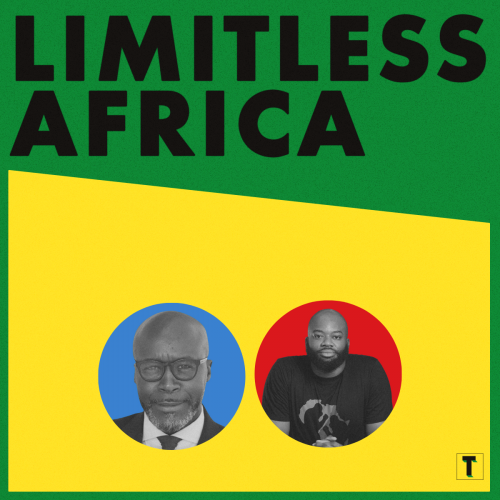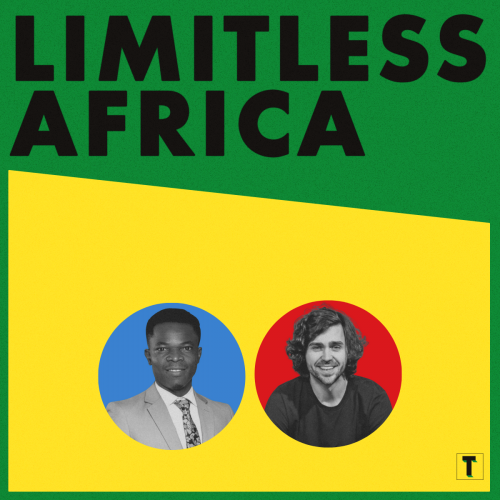Announcing Season 3, Episode 1: Can America First be good for Africa?
With guests

Episode notes
The first episode of Limitless Africa Season 3 dives into the U.S. State Department’s new commercial strategy for Africa and what it means for industries such as sports, film, music, logistics, and technology. The conversation uncovers why Africa is now seen as the world’s largest untapped market, how collaboration can spark innovation, and what it takes to turn goodwill into lasting economic impact. If you want to understand how trade, creativity, and bold thinking are shaping Africa’s future on the global stage, this is the episode to start with.
Transcript
CLAUDE:
So… we’re back.
Limitless Africa.
Season 3.
I’m Claude Grunitzky.
DIMPHO:
And I’m Dimpho Lekgeu.
CLAUDE:
Things are a bit different, look around you, the world order is changing...
CLAUDE:
So… we’re back.
Limitless Africa.
Season 3.
I’m Claude Grunitzky.
DIMPHO:
And I’m Dimpho Lekgeu.
CLAUDE:
Things are a bit different, look around you, the world order is changing.
DIMPHO:
It’s no longer about donor dynamics. It’s about mutual growth.
We’re talking about the shifting relationship between the United States and Africa — and what that means for business, for politics, and for everyday people on both sides of the Atlantic.
CLAUDE:
Now let’s be real. The theme of Limitless Africa going forward is shared prosperity, but we, you and I, Dimpho, live in very different realities. The United States is very different from South Africa. I live in New York City, and you live in Johannesburg, where we are recording this episode. And I want to say something about the fact we’re recording from Flame Studios, a recording studio right across from Constitution Hill, a former prison where Mahatma Gandhi, Nelson Mandela and Winnie Mandela and many others were once incarcerated. And this place has been redesigned as a place where young South Africans can record songs, and videos and create new pathways for future prosperity.
DIMPHO:
Not even close. Our realities are very different, but South Africans and Americans, we want the same thing: prosperity, driven by freedom and democracy.
CLAUDE:
Yes, Dimpho, we’re both Africans who are deeply invested in Africa’s future. I’m Togolese by birth, both of my parents are Togolese and because of Togo’s very complicated political history, I’ve spent my career questioning power — not endorsing it.
But something about this new U.S. posture toward Africa feels… different.
— and this new U.S. policy shift is… well, let’s just say it’s caught our attention.
TROY FITRELL:
And we unveiled a new commercial strategy for the U.S. government and we did that because the world has changed, the U.S. has changed, markets have changed, the economies are vastly different today than they were 25 years ago.
CLAUDE:
Earlier this year, when the U.S. State Department’s Bureau of African Affairs launched their commercial strategy, one of the U.S.’s top diplomats said that Africa is the world’s largest untapped market… and Africa should be among the US’s largest trading partners.
This time, it’s not just about aid.
It’s about partnership.
And — this part is key — it’s about business.
DIMPHO:
And the people we spoke to this season? They know this already.
They’re building businesses, taking risks, and betting big on the continent.
Every single guest — whether they’re in sports, crypto, logistics, media — shares one thing in common: they see Africa as the future. And they also see how Americans can help Africans thrive, they have the experience, and the abundance mindset that has helped America achieve so much.
Ndeye Diarra, who used to work with us at TRUE Africa actually and is now building a sports consultancy across the continent, she put it perfectly:
NDEYE DIARRA:
Sports in Africa is a nascent industry. There’s so much to be built there… You want to scramble and try and understand Africa in 25 years, you have to start understanding Africa now.”
CLAUDE:
I agree. As James Baldwin said, “The time is always now”.
DIMPHO:
Not in 25 years when one in four people on the planet will already be African.
CLAUDE:
The U.S. is definitely leaning in.
Ambassadors are now rated on the commercial deals they close.
TROY FITRELL:
Our embassies – I’m talking to you, private sector – our embassies work for you and this is what we judge our ambassadors on, on how well they support you. And to heads of state and government here today, if our ambassadors are not bringing business deals and commercial opportunity and sustainable economic growth to you, ask them why they are not. Because they should be, they should be with you offering opportunities everyday.
CLAUDE:
The Americans committed $500 million to the Lobito Corridor — a 1,300km railway linking Angola to the DRC. Africa and America need more projects like the Lobito Corridor.
DIMPHO:
And it’s not just about infrastructure and raw materials. It’s about talent, culture, creativity. Africa’s creative economy is growing faster than almost anywhere else. Nollywood is now the second-largest film industry in the world by volume. South African music genres like Amapiano are dominating global playlists.
CLAUDE:
There’s a lot of money to be made. And I should know. I launched TRACE as a media platform showcasing African culture and I ended up selling it to American investors for millions of dollars.
DIMPHO:
I loved your conversation with writer Taiye Selasi, who broke it down beautifully:
TAIYE SELASI:
We are talking about explosively popular content, explosively sellable, bankable product. Let’s look at why, for example, Afrobeats has become more popular to Americans. Well, let’s also remember that there are a lot of Africans in America. And what they’ve done, what we’ve done as we’ve grown as a as a demographic is we’ve been able to surface the things that we like and introduce them to our neighbors and friends. what creates the conditions for access? And we’re living in the time, we’re living in an exciting time because those conditions are just ripe. ”
CLAUDE:
U.S. policy is finally catching up to that reality.
Gone are the days of aid packages and so called handouts.
The U.S. State Department is saying the right things…
DIMPHO:
They’re saying the right things…
CLAUDE:
They no longer see Africa as a continent in need of handouts, but as a capable commercial partner. ‘Trade, not aid’ that’s the new policy.
DIMPHO:
And for our guests on Limitless Africa — this is music to their ears.
CLAUDE:
I spoke to Chris Maurice, the founder of Yellowcard, Africa’s most funded crypto exchange. Chris is American, and he sees Africa as the land of opportunity:
CHRIS MAURICE:
One thing that I firmly believe, right? And again, talking about entrepreneurs and opportunity and things like that, there is so much low-hanging fruit. You don’t need to reinvent the wheel. You just need to understand the local context and be able to apply that in a smart way to to business models that work.”
CLAUDE:
See that’s the thing. There’s a way of doing business in America that really works in America and can work in Africa too. Many Africans can do business like the Americans do and make a lot of money.
DIMPHO:
We’ve heard it again and again this season — from founders, investors, creators — Africa doesn’t want charity. We want partners.
CLAUDE:
But — and this part is important — if Americans are going to be good partners to Africans, they need to take more risks. Would your next office be in Lagos? Or would you think of South Africa for your next investment? Of course, there are risks. But they aren’t as daunting as you might expect…
DIMPHO:
Yeah exactly. For example, Luni Libes, who’s built an agri-investment platform with 23 companies across Africa, told us this:
“Most people think it’s scary. It’s just so far out of the normal day-to-day investing they do that they just don’t. And in fact, what I’ve found is that it’s no different than investing in U.S. companies, that the risk that I’ve seen, the number of companies that have failed in my accelerator portfolio in Africa versus elsewhere is the polar opposite. Far fewer failures in Africa than in the States or in Europe. The opportunities are so much bigger, that the competition level is so much lower.”
CLAUDE:
So this season, we’re asking: What does real partnership look like?
Because, and I’ve been there, Americans have the tech. The capital. The experience.
DIMPHO:
And Africans have the talent, the energy, and the urgency.
CLAUDE:
It’s about collaboration.
Jay Shapiro, who’s building a gaming studio in Nairobi, told us that co-productions between African and American companies are key:
JAY SHAPIRO:
The biggest area for collaboration is in the element of experience. If there’s one thing that Africa is really lacking, it’s experience, because it’s a new industry. And so there’s really an opportunity for African diaspora who are working in the gaming industry in America, to potentially come home and be those mentors and be the voices of wisdom.
DIMPHO:
And it’s not just industry knowledge — it’s mindset.
I love what Owusu Akoto, a U.S.-educated Ghanaian entrepreneur, told you, Claude, when you interviewed him:
OWUSU AKOTO:
The can do attitude, ah which really, for me, encapsulates the American mindset is is is is quite unique. The idea that, you know, every, Clark Kent can become Superman, every Diana Price can become Wonder Woman, just so ingrained in, is one of those take it for granted assumptions that Americans carry around with them and and certainly has rubbed off on me..”
CLAUDE:
But make no mistake — this is a two-way street.
Let’s hear from Tomiwa Aladekomo from Big Cabal Media in Lagos
TOMIWA ALADEKOMO:
And I think that the canniest operators in this space will always find a way. Are they able to invent new ways of making money? Are they able to survive the shocks? Africa and Nigeria have had a number of economic shocks over the last few years. To continue to grow a business and grow in ambition and in scale despite those shocks is definitely a bit of evidence. And so you want to find operators who are able to do that.
CLAUDE:
African founders are dealing with more pressure than anyone in New York or San Francisco.
DIMPHO:
We’ve been talking about this a lot on Limitless since Season 1, but with Season 3 some of our guests are giving us the coolest business case studies around the fact that Africa is no longer just consuming global culture. We are exporting it.
As the Senegalese investor Ibrahim Sagna put it:
IBRAHIM SAGNA:
The continent has always been the source of a large source of talent, content that used to be only coming from the U.S. to other market. You’re observing a shift. You’re getting content from Africa that’s being consumed by people in the U.S. or Latin America or Asia”
CLAUDE:
That’s the world we’re walking into.
A world where Africans and Americans can collaborate not just as trading partners — but as equals.
DIMPHO:
So what’s the catch?
Well, this new America is … different.
CLAUDE:
And it’s already affected me personally. Some of my relatives in Togo can no longer get U.S. visas. And that’s a real sadness for me, my aunt can’t visit my seven-year-old son.
DIMPHO:
My country South Africa, where we are right now, is facing new tariffs. While USAID is pretty much gone. And PEPFAR, the U.S.-funded AIDS relief program which has saved millions of lives, well it survived the funding cuts — for now —
CLAUDE
So yes, it’s complicated.
DIMPHO:
But that’s the thing. Relationships evolve.
Even allies disagree.
And this isn’t just about South Africa or Togo — it’s a global trend.
CLAUDE:
But let’s not pretend anyone else has clean hands.
China, Russia, even Europe — there are always strings attached.
Quid pro quo deals. Soft power diplomacy.
DIMPHO:
Strategic investments with quiet conditions.
CLAUDE:
Take China’s new “no-tariffs” announcement — it excluded one country in Africa: Eswatini. Why? Because Eswatini recognizes Taiwan.
And Europe is even more complicated,
DIMPHO:
There’s a lot of colonial baggage.
And let’s be real — is there such a thing as the “Russian Dream”?
CLAUDE:
And China? Well, there’s no line of migrants at the Chinese border.
DIMPHO:
Speaking of changing and complicated global partnerships, I’m South African and we have a pretty good relationship with both China and Russia because of the economic trading bloc known as BRICS.
CLAUDE:
But we still need to talk about America?
Despite everything it still represents opportunity. I can speak as someone who’s been living in America for 27 years. America has given me everything. And I became an American citizen.
At least with the U.S. — what you see is what you get.
There’s a famous saying: “The business of America is business.”
And we’ve seen that the American President is meeting lots of African leaders face-to-face.
PRESIDENT TRUMP:
And we’re working tirelessly to forge new economic opportunities involving both the U.S. and many African nations. There’s great economic potential in Africa, like few other places, in the long run this will be far more effective and sustainable and beneficial than anything else we could be doing together.”
DIMPHO:
And maybe that’s what makes this moment so complex — and so full of possibility.
CLAUDE:
If more Americans look at Africa not as a charity case, but as a commercial partner — that changes the game.
DIMPHO:
African leaders must be ready too. Ready to negotiate deals that benefit the continent long-term.
CLAUDE:
So Season 3 of Limitless Africa dives straight into all of this.
DIMPHO:
And we won’t be asking softball questions – how do we make sure that this new moment isn’t just talk — but a turning point?
CLAUDE:
Because Africa doesn’t need pity.
It needs partners.
DIMPHO:
And America?
If it’s smart — if it’s bold — it could become the partner of choice.
Because the future of Africa — and the future of global business — are intertwined.
CLAUDE:
So tune in.
This September.
Limitless Africa.
DIMPHO:
Season 3!
Listen next
"I got exactly what I wanted, which was my DMs full of Nigerian men"
With guests: Chris Maurice
LISTEN NOW 37 min
How crypto is making sending money cheaper in Africa
With guests: Chris Maurice, Frank Eleanya, Peter Onisha Peregbakumo
LISTEN NOW 15 min








